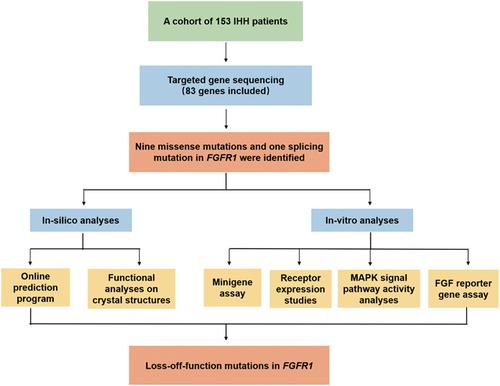当前位置:
X-MOL 学术
›
Clin. Genet.
›
论文详情
Our official English website, www.x-mol.net, welcomes your
feedback! (Note: you will need to create a separate account there.)
Combined in-vitro and in-silico analyses of FGFR1 variants: genotype-phenotype study in idiopathic hypogonadotropic hypogonadism.
Clinical Genetics ( IF 2.9 ) Pub Date : 2020-07-14 , DOI: 10.1111/cge.13814 Daoqi Wang 1, 2 , Yonghua Niu 3 , Jiahong Tan 4 , Yinwei Chen 1, 2 , Hao Xu 1, 2 , Qing Ling 1, 2 , Jianan Gong 1, 2 , Le Ling 1, 2 , Jiaxin Wang 1, 2 , Tao Wang 1, 2 , Jihong Liu 1, 2
Clinical Genetics ( IF 2.9 ) Pub Date : 2020-07-14 , DOI: 10.1111/cge.13814 Daoqi Wang 1, 2 , Yonghua Niu 3 , Jiahong Tan 4 , Yinwei Chen 1, 2 , Hao Xu 1, 2 , Qing Ling 1, 2 , Jianan Gong 1, 2 , Le Ling 1, 2 , Jiaxin Wang 1, 2 , Tao Wang 1, 2 , Jihong Liu 1, 2
Affiliation

|
Fibroblast growth factor receptor 1 (FGFR1) is an idiopathic hypogonadotropic hypogonadism (IHH)‐associated gene, mutated in approximately 10% of the patients with this condition. Through targeted gene sequencing of 153 males with IHH and 100 healthy controls, we identified 10 mutations in FGFR1 from IHH patients with a frequency of 5.9% in the Chinese population of central China. These included nine missense mutations(NM_023110.2, p.Gly687Arg, p.Ala608Asp, p.Gly348Glu, p.Asn296Ser, p.Gly226Asp, p.Arg209Cys, p.Gly97Arg, p.Val71Met, p.Gly70Arg) and a splicing mutation c.1430 + 1G > T. in vitro and in silico analyses of FGFR1 variants were conducted to study the impact of the identified mutations. Our findings indicated that the splicing mutation dramatically affected premRNA processing, causing exon 10 and 6 nucleotides in the 3′ end of exon 9 to be completely skipped. Two variants (p.Gly687Arg and p.Ala608Asp) markedly impaired tyrosine kinase activity, while the other variants had limited impact on the mitogen‐activated protein kinase (MAPK) signaling pathway. However, the functional impairment of the mutant receptors was not always consistent with the phenotypes, indicating that FGFR1 mutations might cause IHH in conjunction with other mutant genes. In this study, we expanded the knowledge on the mutation spectrum of FGFR1 in IHH patients and explored the genotype‐phenotype relationship.
中文翻译:

FGFR1变体的体外和计算机模拟分析:特发性性腺功能减退性腺功能减退症的基因型-表型研究。
成纤维细胞生长因子受体1(FGFR1)是特发性促性腺激素性性腺功能低下(IHH)相关基因,在这种情况下约有10%的患者发生了突变。通过对153名患有IHH的男性和100名健康对照的目标基因进行测序,我们在中部华人人群中发现了来自IHH患者的FGFR1的10个突变,频率为5.9%。这些包括九个错义突变(NM_023110.2,p.Gly687Arg,p.Ala608Asp,p.Gly348Glu,p.Asn296Ser,p.Gly226Asp,p.Arg209Cys,p.Gly97Arg,p.Val71Met,p.Gly70Arg)和剪接突变。 c.1430 + 1G> T.在体外和在计算机芯片上的分析FGFR1进行变体研究鉴定的突变的影响。我们的发现表明,剪接突变极大地影响了premRNA的加工,导致外显子9 3'端的外显子10和6核苷酸被完全跳过。两个变体(p.Gly687Arg和p.Ala608Asp)显着损害酪氨酸激酶活性,而其他变体对促分裂原活化蛋白激酶(MAPK)信号传导途径的影响有限。但是,突变受体的功能损害并不总是与表型一致,这表明FGFR1突变可能与其他突变基因一起引起IHH。在这项研究中,我们扩展了IHH患者中FGFR1突变谱的知识,并探讨了基因型与表型的关系。
更新日期:2020-07-14
中文翻译:

FGFR1变体的体外和计算机模拟分析:特发性性腺功能减退性腺功能减退症的基因型-表型研究。
成纤维细胞生长因子受体1(FGFR1)是特发性促性腺激素性性腺功能低下(IHH)相关基因,在这种情况下约有10%的患者发生了突变。通过对153名患有IHH的男性和100名健康对照的目标基因进行测序,我们在中部华人人群中发现了来自IHH患者的FGFR1的10个突变,频率为5.9%。这些包括九个错义突变(NM_023110.2,p.Gly687Arg,p.Ala608Asp,p.Gly348Glu,p.Asn296Ser,p.Gly226Asp,p.Arg209Cys,p.Gly97Arg,p.Val71Met,p.Gly70Arg)和剪接突变。 c.1430 + 1G> T.在体外和在计算机芯片上的分析FGFR1进行变体研究鉴定的突变的影响。我们的发现表明,剪接突变极大地影响了premRNA的加工,导致外显子9 3'端的外显子10和6核苷酸被完全跳过。两个变体(p.Gly687Arg和p.Ala608Asp)显着损害酪氨酸激酶活性,而其他变体对促分裂原活化蛋白激酶(MAPK)信号传导途径的影响有限。但是,突变受体的功能损害并不总是与表型一致,这表明FGFR1突变可能与其他突变基因一起引起IHH。在这项研究中,我们扩展了IHH患者中FGFR1突变谱的知识,并探讨了基因型与表型的关系。











































 京公网安备 11010802027423号
京公网安备 11010802027423号